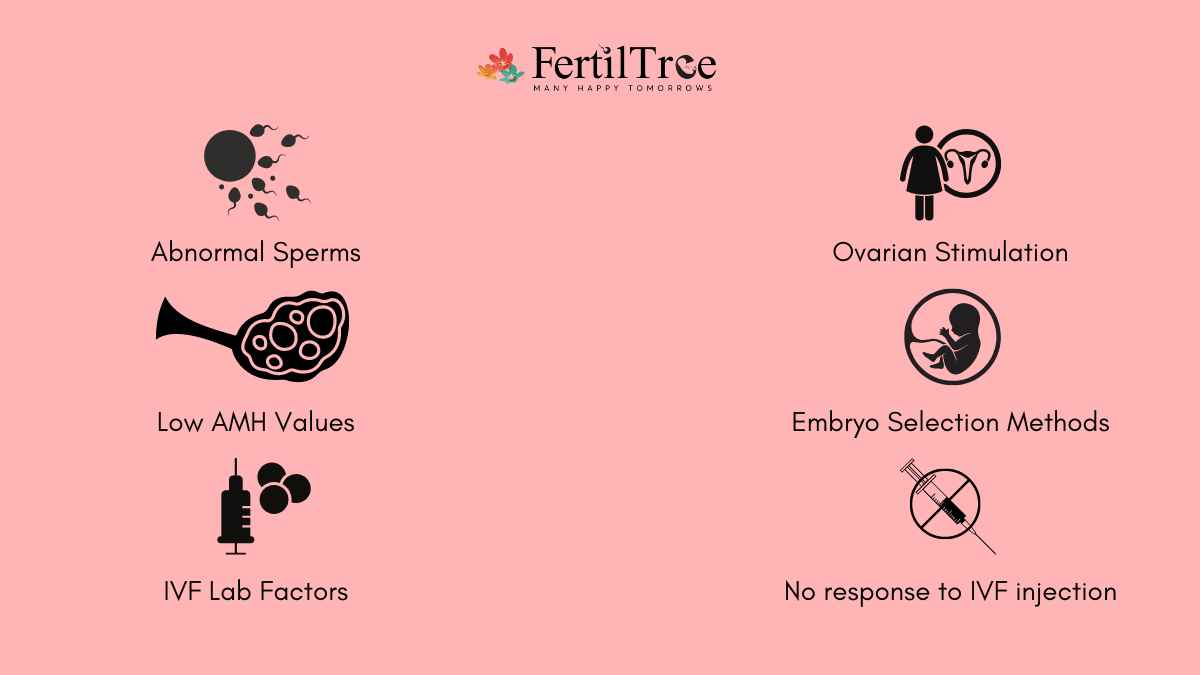
IVF is a beautiful journey towards parenthood. Even though our clinic has one of the highest success rates in India, couples need to have a realistic picture of success with IVF. When IVF does not work, many couples feel like they have reached the end of the road. But your mental well-being is a priority. Therefore, it is vital to identify the reasons for the failure to decide how to proceed. Here, we will discuss some of the top reasons for IVF failure and some steps to make IVF successful.
Top 10 reasons behind most IVF failures are:
- Poor Sperm Quality and abnormal sperm
- Low Anti-Mullerian Hormone (AMH) Values
- Implantation Failure
- Poor quality of Eggs and Embryos
- Oocyte’s Age
- IVF Lab factors
- Ovarian Stimulation
- Embryo Transfer
- Poor or no response to ovarian stimulation
Top 10 reasons for IVF Failure – Detailed Overview
1. Poor Sperm Quality and abnormal sperm
Sperm contributes to the well-being of the embryo. Men with severe male factors such as azoospermia due to genetic causes and diabetes may produce poor quality and quantity of sperm.
Chromosomal abnormalities in the sperm may affect the quantity and quality of sperm. Hence at the time of and post-fertilisation, the embryo becomes abnormal. It can have less number of chromosomes or twice and thrice the number of chromosomes. The DNA in the sperm head can undergo breaks leading to DNA fragmentation and eventually failed implantation and miscarriage.
2. Low Anti-Mullerian Hormone (AMH) Values
Low AMH values can diminish the success of IVF. AMH is a hormone secreted by the granulosa cells present in the egg sacs (follicles). The level of AMH in a woman’s blood is generally a good indicator of her ovarian reserve. Women with low AMH values may produce unhealthy eggs that may not implant.
The top Factors That Cause a Decrease in AMH Levels are:
- Increasing age & Obesity]
- Smoking, Alcohol Consumption & substance abuse
- Chemotherapy or Radiation Therapy
Read more: how to improve AMH level?
3. Implantation Failure
Implantation failure is one of the common causes of IVF failures.
The primary reasons for implantation failure are:
- A thin lining, a non-receptive lining, or a lining affected by genital TB.
- Existing immunological conditions which make the uterine environment hostile to the embryos.
- The endometrium has an inbuilt mechanism to reject poor-quality embryos for implantation.
4. Poor quality of Eggs and Embryos
The quality of the eggs can be a significant reason for IVF failure. The egg quality is directly linked to the woman’s age and health. Oocytes have 23 chromosomes. If these chromosomes are missing or arranged haphazardly, they can produce abnormal embryos. Sometimes the way that the egg is fertilised can lead to chromosomal abnormalities.
As a woman ages, her eggs become less healthy and more prone to genetic abnormalities. This can make it difficult for them to be fertilised by sperm and lead to an embryo that cannot survive.
IVF may fail if the embryos are not of good quality. One of the reasons is genetic abnormalities in the embryos. This, in fact, is nature’s way of preventing an abnormal embryo from implanting.
Read more: IVF Success Rate By Age
5. Oocyte’s Age
Eggs reach peak fertilising potential between the ages of 24 to 34.
6. IVF Lab factors
The IVF lab is the main support of an IVF centre. Embryos are susceptible to changes in oxygen and carbon dioxide concentration, humidity, PH, temperature and light. A trained and experienced embryologist can enhance the success of IVF.
7. Ovarian Stimulation
Oocyte quality depends on successful controlled ovarian stimulation. The appropriate dose of hormonal injections contributes to the success of obtaining good-quality eggs. Inappropriate ovarian stimulation can lead to a poor ovarian response, a hyperstimulated response and or poor quality of oocytes.
How do Ovarian Response methods affect IVF success?
Good ovarian stimulation gives a better number and quality of eggs. Follicular monitoring ensures that the follicular growth is monitored and the doses of hormonal injections are titrated as per the response, resulting in better pregnancy rates.
8. Embryo selection methods
Embryo selection is carried out by morphological examination under the microscope. Preimplantation Genetic testing deselects abnormal embryos allowing genetically normal embryos to be selected for embryo transfer. Artificial Intelligence tools also enable selection of embryos that have the best chances of implantation.
9. Embryo Transfer
An atraumatic and smooth embryo transfer contributes to the success of implantation.
The type of catheter used and the direction and depth to which the catheter is placed in the uterus also contribute to success. Carrying out embryo transfer under ultrasound guidance also improves the chances of pregnancy with IVF.
10. Poor or no response to ovarian stimulation.
A very low AMH is suggestive of a severely diminished ovarian reserve and depletion of oocytes. Such a condition results in a poor or no response to medication. Women with severe PCOS may also not respond appropriately, in which case a tailor-made protocol has to be implemented.
It is important to get to the root cause of IVF failure.
In case of IVF failure, we need to look at the uterine lining, the quality of the eggs and the sperm and the quality of the embryos formed.
IVF failed – What next?
Here are the things to note down while going for another attempt at IVF:
- Ask your IVF doctor about your chances of success with the second attempt.
- Consider modifying the ovarian stimulation.
- Depending on the reason for failed IVF after several attempts, the doctor may suggest using donor
- Eggs, sperm, or embryos may be considered.
- If the problem is the uterine lining, the doctor may suggest surrogacy.

